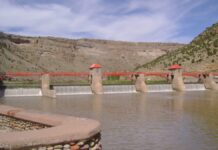These hay fields may know something we don’t: how to save the Colorado River
A $1 million science experiment on Colorado hay fields is backed by powerful water groups, farm interests, and environmentalists.
Even in a pandemic, drought drives water use along the Front Range
Municipal water providers saw commercial water use plummet at the beginning of the pandemic but those savings were erased once the hot summer rolled in.
Water conservation payments to Colorado ranchers could top $120M; is it enough?
A new economic study suggests that a wide-scale water conservation program in Colorado could cost more than $120 million.
Water released from Elkhead Reservoir lifts call on Yampa River
The second-ever call on the Yampa River was lifted after water providers announced an Elkhead Reservoir water release to support irrigators and endangered fish.
CD3 candidates agree on protecting Western Slope water, reservoir enlargements
Diane Mitsch Bush, the Democratic candidate for Colorado’s 3rd Congressional District, pledged cooperation and Lauren Boebert, her Republican challenger, promised to fight — the Front Range, neighboring states and the federal government — to protect Western Slope water.
Reservoir-release pilot project in Colorado to test possible compact call
Front Range water providers recently released water stored in Homestake Reservoir to test how to get water downstream to the state line in the event of a Colorado River Compact call.
Aspen officials want more data to plan for drought, seeking $59k for more tools
The city of Aspen is hoping some grant money can help it collect more data on snow and streams in the high country so it can better predict and plan for droughts.
Dillon Reservoir water levels hold on despite statewide drought
Amid one of the hottest summers on record for Colorado, Dillon Reservoir is 94% full, nearly 5 feet below its capacity. This level of drought has been manageable this year for Denver Water partly because of the 2018-19 winter.
State to host public confabs on next steps in study of Lake Powell drought...
A statewide public effort to determine whether Coloradans should engage in perhaps the biggest water conservation program in state history enters its second year of study this summer, but the complex, collaborative effort on the Colorado River has a long way to go before the state and its water users can make a go/no-go decision, officials said.
Water, money, and power in Colorado – Water Buffs Podcast ep. 3 – Heather Sackett
Water Desk Director Mitch Tobin talks to Heather Sackett, managing editor at Aspen Journalism, about water issues in Colorado, including several stories that explore the potential transfer of water from rural areas to growing cities.












